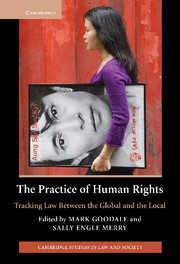Book contents
- Frontmatter
- Contents
- Contributors
- Acknowledgments
- Introduction Locating rights, envisioning law between the global and the local
- PART ONE STATES OF VIOLENCE
- PART TWO REGISTERS OF POWER
- Introduction
- 3 The power of right(s): tracking empires of law and new modes of social resistance in Bolivia (and elsewhere)
- 4 Exercising rights and reconfiguring resistance in the Zapatista Juntas de Buen Gobierno
- PART THREE CONDITIONS OF VULNERABILITY
- PART FOUR ENCOUNTERING AMBIVALENCE
- Conclusion Tyrannosaurus lex: the anthropology of human rights and transnational law
- Index
- References
4 - Exercising rights and reconfiguring resistance in the Zapatista Juntas de Buen Gobierno
Published online by Cambridge University Press: 29 March 2011
- Frontmatter
- Contents
- Contributors
- Acknowledgments
- Introduction Locating rights, envisioning law between the global and the local
- PART ONE STATES OF VIOLENCE
- PART TWO REGISTERS OF POWER
- Introduction
- 3 The power of right(s): tracking empires of law and new modes of social resistance in Bolivia (and elsewhere)
- 4 Exercising rights and reconfiguring resistance in the Zapatista Juntas de Buen Gobierno
- PART THREE CONDITIONS OF VULNERABILITY
- PART FOUR ENCOUNTERING AMBIVALENCE
- Conclusion Tyrannosaurus lex: the anthropology of human rights and transnational law
- Index
- References
Summary
What was lost in the promulgation of human rights theory in the 1990s was the connection between rights and subjects who can exercise those rights.
Chandler 2002: 114Now, we have to exercise our rights ourselves. We don't need anyone's permission, especially that of politicians … Forming our own autonomous municipalities, that's what we are doing in practice and we don't ask anyone's permission.
Comandanta Esther August 2003FROM GUNS TO SHELLS
Introduction
On an August day in 2003, I huddled beneath a plastic tarp through a typical afternoon downpour in the highlands community of Oventic, Chiapas. While the weather was not unusual, the day itself was far from typical: I stood, accompanied by several thousand others – indigenous people from throughout the state and activists from throughout the country and the world – listening to the speeches of Zapatista leaders. They spoke of the birth of the five “caracoles” (literally, shells, but indicating meeting points) and the formation of the five Juntas de Buen Gobierno (“Good Governance Councils,” herein referred to as Juntas) to be seated in them. It was a major turning point for Zapatismo, signaling a transition from military to civilian governance and the formal end to their petition for state recognition of their collective right to autonomy. In the words of Rosalinda, “The government didn't pay attention to us. Que se queden con sus pendejadas. We know how to make our municipalities work.
- Type
- Chapter
- Information
- The Practice of Human RightsTracking Law between the Global and the Local, pp. 163 - 192Publisher: Cambridge University PressPrint publication year: 2007
References
- 19
- Cited by



